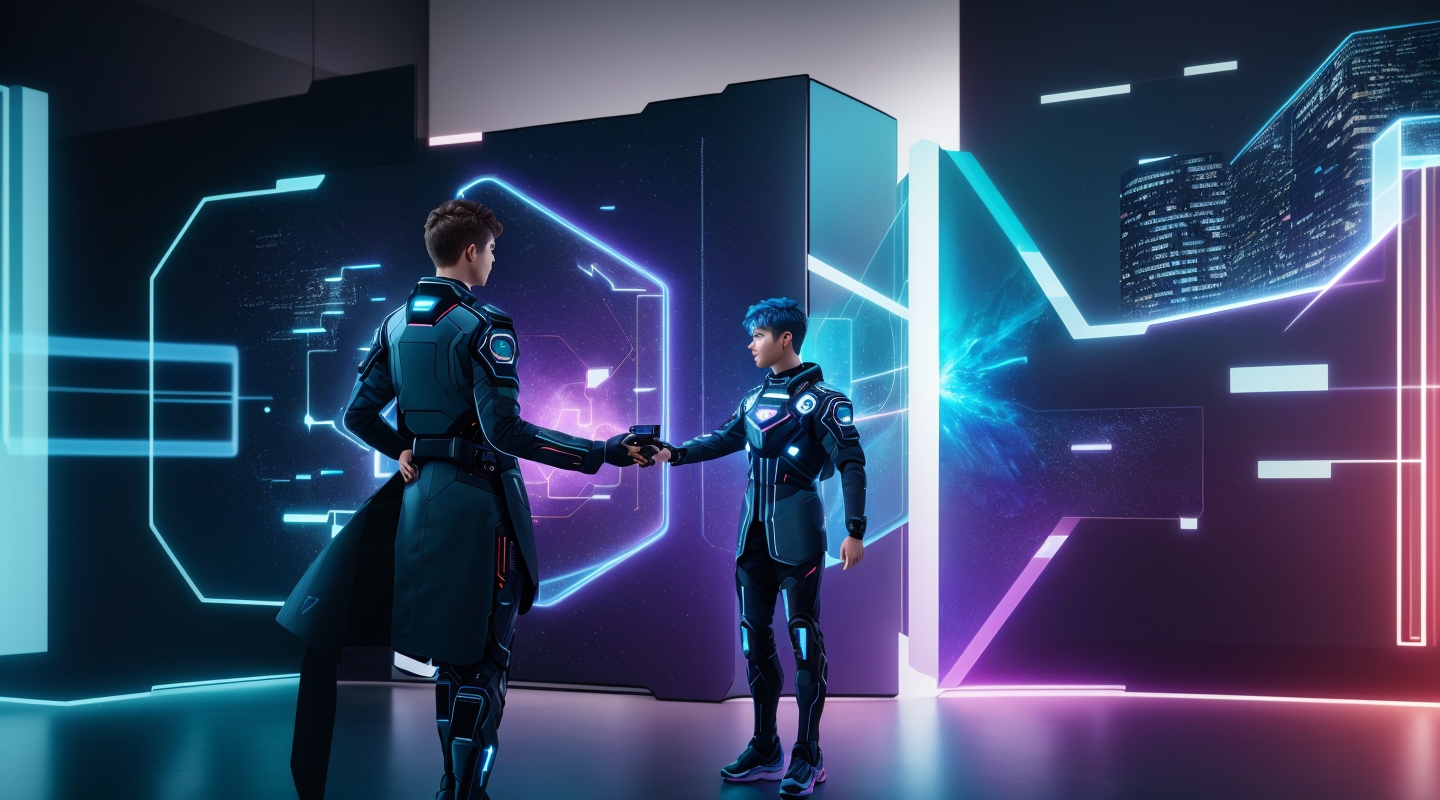
AI for Content Curation
AI for Content Curation
How AI is Revolutionizing the World of Content Curation
Content curation has long been a crucial process in the digital age, enabling individuals and businesses to sift through the overwhelming amount of information available and present the most relevant and valuable content to their audiences. However, with the rapid advancements in artificial intelligence (AI), the landscape of content curation is undergoing a paradigm shift.
The Evolution of Content Curation
Content curation has evolved from manual processes to more sophisticated approaches, thanks to AI technology. In the past, content curators had to spend countless hours manually searching for relevant information, analyzing it, and organizing it in a coherent way. But AI has transformed this laborious task into a streamlined and efficient process.
Understanding AI and Content Curation
Defining AI and Content Curation
Artificial intelligence refers to the development of computer systems that can perform tasks that would typically require human intelligence. Content curation, on the other hand, involves the selection, organization, and presentation of relevant content to meet specific goals or cater to specific audiences.
The Role of AI in Content Curation
AI plays a crucial role in content curation by automating and optimizing various tasks involved in the process. It enables content curators to efficiently discover, evaluate, categorize, and distribute content to their audiences. By leveraging AI, content curators can save time, improve accuracy, and provide personalized experiences to their users.
The Mechanics of AI in Content Curation
How AI Streamlines Content Curation
AI technology streamlines content curation by automating and augmenting various tasks. It can crawl the web and aggregate content from various sources, analyze the content using natural language processing algorithms, and categorize it based on predefined criteria. This automation enables content curators to focus on higher-level tasks, such as strategy and creativity.
AI and Content Discovery
One of the key challenges in content curation is discovering relevant and high-quality content from the vast amount of information available. AI algorithms can analyze user behavior, preferences, and historical data to deliver personalized content recommendations. By understanding user interests and preferences, AI can effectively surface content that is most likely to resonate with individual users.
AI and Content Organization
AI technology can efficiently organize curated content by categorizing it based on various factors, such as topic, format, and relevance. AI algorithms can automatically tag content, create taxonomies, and build knowledge graphs that facilitate the discovery and navigation of curated content. This organization makes it easier for audiences to find the information they are looking for and enhances the overall user experience.

AI Tools for Content Curation
An Overview of AI Tools in the Market
The market for AI tools in content curation is rapidly expanding, offering a wide range of solutions to assist content curators in their work. These tools leverage AI technologies such as natural language processing, machine learning, and deep learning to automate and enhance various aspects of content curation. Some of the popular AI tools in the market include Quuu, Opus Clip, and ChatGPT.
Case Study: Quuu
Quuu is an AI-powered content curation tool that helps content curators discover and share relevant content on social media. It uses AI algorithms to analyze user preferences and automatically suggests curated content that aligns with the user's interests. Quuu's AI technology ensures that curators can consistently provide valuable content to their audience while saving time and effort.
Case Study: Opus Clip
Opus Clip is an AI-powered content curation tool that focuses on video content. It leverages AI algorithms to analyze video content and automatically generate short clips that curators can use to enhance their content. Opus Clip's AI technology enables curators to quickly find and incorporate engaging video snippets into their curated content, enhancing its appeal and increasing audience engagement.
Case Study: ChatGPT
ChatGPT is an AI language model developed by OpenAI that can be utilized for content curation. By leveraging natural language processing algorithms, ChatGPT can assist content curators in finding relevant content, summarizing articles, and generating engaging titles. It enables curators to automate and augment their content curation process, making it more efficient and effective.
The Benefits of AI in Content Curation
Increased Efficiency
AI technology significantly improves the efficiency of content curation by automating time-consuming tasks. Content curators can leverage AI tools to quickly discover, analyze, and organize content, freeing up their time for higher-level activities.
Improved Accuracy
AI algorithms are capable of analyzing vast amounts of data and extracting valuable insights with a high degree of accuracy. This increased accuracy ensures that curated content is relevant, high-quality, and aligns with the audience's interests and preferences.
Personalization
AI technology allows content curators to provide personalized experiences by understanding user behavior and preferences. By delivering curated content tailored to individual users, curators can enhance user engagement and satisfaction.
Scalability
With the assistance of AI, content curators can scale their operations and reach a wider audience. AI tools can efficiently handle large volumes of content, ensuring that curated content meets the demands of a growing user base.
Continuous Improvement
AI algorithms continuously learn and improve over time. By analyzing user feedback and data, AI tools can adapt and refine their recommendations, ensuring that curated content becomes increasingly relevant and valuable.
Challenges and Ethical Considerations in AI for Content Curation
The Risk of Bias
AI algorithms are trained on data that may contain biases, which can inadvertently influence the curated content. Content curators must be aware of this risk and take steps to ensure fair and unbiased content curation.
Privacy Concerns
Leveraging AI for content curation involves analyzing user data and behavior. Content curators must be mindful of privacy concerns and ensure that user data is handled securely and ethically.
The Balance Between Automation and Human Touch
While AI technology can automate various aspects of content curation, it is crucial to strike a balance between automation and the human touch. Curators must add their expertise, creativity, and judgment to ensure that curated content meets the specific needs and preferences of their audience.

The Future of AI in Content Curation
Predictive Analysis and Personalization
AI technology is poised to advance further in predictive analysis, enabling content curators to anticipate user needs and deliver personalized content recommendations proactively. By leveraging machine learning and user behavior analysis, AI can enhance the personalization of curated content.
Integration with Other Technologies
The integration of AI with other emerging technologies, such as natural language generation and augmented reality, holds immense potential for content curation. These technologies can enhance the presentation and delivery of curated content, providing immersive and interactive experiences for users.
Better Data Quality
AI algorithms heavily rely on data for training and analysis. Improvements in data collection and quality assurance techniques can further enhance the accuracy and relevance of AI-powered content curation.
More Specialized Applications
As AI technology continues to evolve, we can expect to see more specialized applications in content curation. These applications might cater to specific industries, niches, or user preferences, ensuring highly targeted and valuable curated content.
Real-World Applications of AI in Content Curation
Case Study: AI in News Media Curation
News media organizations are leveraging AI to curate relevant news articles for their readers. AI algorithms can analyze massive amounts of news data, filter out misinformation, and deliver curated content that provides accurate and diverse perspectives on current events.
Case Study: AI in E-commerce Curation
E-commerce platforms are utilizing AI to curate personalized product recommendations for their customers. By analyzing user preferences, purchase history, and browsing behavior, AI algorithms can suggest relevant products, enhancing the shopping experience and driving sales.
Case Study: AI in Social Media Curation
Social media platforms employ AI to curate content for their users' feeds. AI algorithms analyze user behavior, interests, and social connections to deliver personalized content that is most likely to engage and resonate with users.
Conclusion
In the ever-expanding world of content curation, AI technology is revolutionizing the process by automating and optimizing various tasks. By leveraging AI tools, content curators can save time, improve accuracy, provide personalized experiences, and scale their operations. However, challenges such as bias, privacy concerns, and the need for a human touch must be acknowledged and addressed. As AI continues to advance, the future of content curation holds immense possibilities for predictive analysis, integration with other technologies, and specialized applications across various industries. The transformative potential of AI in content curation is evident, promising to deliver curated content that is tailored, valuable, and engaging to audiences around the world.

AI and Content Curation in Different Industries
AI for Content Curation in Healthcare
Healthcare organizations are increasingly using AI for content curation to provide accurate and relevant information to patients, healthcare professionals, and researchers. AI algorithms analyze medical literature, patient data, and clinical trials to curate content that aids in diagnosis, treatment decisions, and advancements in medical research.
AI for Content Curation in Finance
In the finance industry, AI-powered content curation tools are utilized to curate market insights, financial news, and investment recommendations. These tools analyze vast amounts of financial data and utilize machine learning algorithms to deliver curated content that helps investors make informed decisions.
AI for Content Curation in Entertainment
The entertainment industry benefits from AI-driven content curation by delivering personalized recommendations to users for movies, music, books, and other forms of entertainment. AI algorithms analyze user preferences, viewing patterns, and demographic data to curate content that aligns with individual tastes, enhancing the overall entertainment experience.
Comparative Analysis of AI Content Curation Tools
When choosing an AI content curation tool, it's crucial to understand the features, pricing options, and user experiences associated with different platforms. A comparative analysis of various AI content curation tools, such as their algorithm capabilities, content sources, customization options, and customer reviews, can assist content curators in making informed decisions about which tool best suits their needs.
The Role of AI in Content Curation for SEO
AI technology can play a vital role in optimizing curated content for search engine optimization (SEO). AI algorithms can analyze keyword trends, user search patterns, and SEO best practices to help content curators curate content that is more likely to rank highly in search engine results. By leveraging AI, content curators can ensure their curated content is discoverable and drives organic traffic to their websites.
User Experience with AI Content Curation
Understanding the user experience with AI-curated content is crucial for content curators seeking to cater to their audience's preferences. Research and user feedback can shed light on how content creators and consumers perceive AI-curated content, their level of satisfaction, and their preferences for human curation versus AI-driven curation. This understanding can help content curators tailor their strategies to enhance the user experience and engagement.
The Impact of AI on Content Curation Jobs
The advent of AI technology in content curation raises concerns about its impact on the job market for content curators. While AI streamlines certain tasks, content curation still requires human expertise and creativity. As a result, new skills are emerging as essential in the AI-driven landscape, such as the ability to understand and leverage AI algorithms, data analysis, and strategic thinking. Content curators need to adapt and upskill to remain competitive in the evolving job market.
Legal and Regulatory Considerations for AI in Content Curation
Using AI for content curation involves the collection and analysis of user data, which raises legal and regulatory considerations. Content curators must navigate data privacy laws, ensure compliance with regulations such as the General Data Protection Regulation (GDPR), and maintain transparency in how user data is used for AI-driven content curation. Understanding and addressing these legal and regulatory considerations are crucial to maintaining trust and mitigating potential risks.

AI Automation Agency Services
AI automation agencies leverage AI technologies to automate content curation tasks, saving considerable time and resources and increasing output efficiency. Here's how they're applied in authority websites, social media posts, feature images, and AI-driven apps.
AI in Authority Websites
Authority websites, recognised for their consolidated wealth of valuable and trustworthy information, can benefit greatly from AI algorithms. AI can automate the entire content curation process, scanning countless online resources to gather, organise, and present the most relevant and authoritative content. This process enhances the site's value, keeps it updated with fresh content, and helps maintain its authority status.
AI in Social Media Posts
With an overwhelming amount of content posted on social media every minute, AI becomes indispensable. Automation agencies use AI to curate social media posts that match the brand voice and ethos while staying relevant and engaging to the target audience. From identifying trending topics and analysing competitor strategies to automating the scheduling and posting process, AI revolutionises social media content curation.
AI in Feature Images
Images play a key role in enhancing the impact of online content. With AI, automation agencies can curate feature images that resonate with the content and attract audiences. AI-driven image recognition and sorting allows for automatic selection of suitable images from vast databases, saving time and delivering visually-stunning results.
AI-Driven Apps
Apps equipped with AI capabilities can automate content discovery, categorisation, and distribution. For instance, AI-driven news apps curate articles relevant to individual users based on their reading history and preferences. Similarly, e-commerce apps use AI to curate personalised product recommendations. AI-integrated apps not only enhance the user experience but also up their engagement level, leading to increased user retention and platform growth.
Overall, AI automation agency services are fundamentally reshaping content curation across various platforms and applications, offering enhanced accuracy, efficiency, and user engagement. The future, it seems, is ripe with possibilities for AI in content curation.

FAQs
What is AI for Content Curation?
AI for Content Curation refers to the use of Artificial Intelligence technologies to automate the process of collecting, organizing and presenting digital content relevant to a specific topic.
How does AI streamline Content Curation?
AI streamlines Content Curation by automating the process of searching and sorting through large volumes of content. It uses machine learning to understand user behaviors and preferences, resulting in the curation of personalized and relevant content.
What are some examples of AI tools for Content Curation?
There are numerous AI tools for content curation. Some examples include Quuu, which curates content based on user-selected interests, Opus Clip that uses AI to understand user preferences and curates personalized content, and ChatGPT which generates human-like text.
What are the benefits of employing AI in Content Curation?
Benefits of AI in Content Curation include increased efficiency as AI can curate large volumes of content quickly, improved accuracy due to sophisticated algorithms, personalization by delivering content suited to each users’ preference, and scalability as AI evolves and learns from the high volume of processed data.
Are there any challenges or ethical considerations when using AI for Content Curation?
Yes, despite the numerous benefits, AI’s use in content curation also presents challenges like the risk of bias, privacy concerns over the vast amounts of user data processed, and the need for a balance between automation and human touch in content.






























